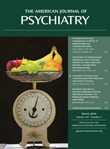Psychosis Following Excessive Ingestion of Energy Drinks in a Patient With Schizophrenia
To the Editor: Caffeine can induce psychosis in healthy people (1) and worsen psychotic symptoms in individuals with psychotic disorders (2, 3). We describe a patient with schizophrenia who experienced psychotic decompensation while using energy drinks.
"Mr. C" was a 43-year-old man with schizophrenia, paranoid type, and alcohol dependence, in full sustained remission, who presented with a 6-week history of progressively worsening paranoia, religious delusions, and agitation.
The patient had been stable and without hospitalization for several years. He was managed with haloperidol decanoate injections (150 mg every 4 weeks). He had not used alcohol for 30 months, had intermittently used cannabis and cocaine in his early twenties (with no recent use, confirmed by negative toxicology analysis), and did not previously use caffeine or cigarettes.
The patient began drinking energy drinks 8 weeks prior to presentation. He reported feeling increased interest in activities and improved mood after drinking his first can of the drink, subsequently increasing his daily consumption up to eight to 10 cans (16 oz per can) daily.
Mr. C displayed paranoia, internal preoccupations, constricted affect, and delusional religious beliefs. He was hospitalized; his consumption of caffeine was ceased; and no new antipsychotic treatments were prescribed. Ten days later, he was better related, less paranoid, and calmer, with diminished religious delusions. He was discharged from the hospital while taking haloperidol decanoate (150 mg), with appropriate follow-up appointments.
Caffeine functions in the central nervous system as a competitive antagonist of adenosine receptors, A1 and A2A, and alters neurotransmitter release, including dopamine and glutamate. This dopamine release in the striatum may underlie caffeine's reinforcing properties, and the modulation of the mesolimbic dopamine pathway may be related to its psychotomimetic effect (1). Exaggerated effects may be seen in patients with schizophrenia using high-dose caffeine (2). The energy drink the patient in the present case consumed contained 160 mg of caffeine per can. The patient weighed 67 kg and therefore consumed approximately 20 mg/kg per day of caffeine. Psychosis has been reported at doses near 10 mg/kg per day (3), which is well below the known toxic dosage (150–200 mg/kg) but above the average intake by the numerous schizophrenia outpatients who use caffeine (1.8–4.1 mg/kg per day [depending on smoking status]) (4).
Although we cannot definitively demonstrate a causal relationship between the use of energy drinks and psychotic decompensation, the temporal association is convincing. The patient in our case adhered with pharmacotherapy and had no recent stressor. He improved with supportive care in a controlled environment and without pharmacological intervention, a course consistent with caffeine-induced psychosis.
1 : Caffeine-induced psychosis. CNS Spectr 2009; 14:127–129 Crossref, Medline, Google Scholar
2 : Effects of the acute administration of caffeine in patients with schizophrenia. Biol Psychiatry 1990; 28:35–40 Crossref, Medline, Google Scholar
3 : Improvement from treatment-resistant schizoaffective disorder, manic type after stopping heavy caffeine intake: a case report. Prog Neuropsychopharmacol Biol Psychiatry 2008; 32:1349–1350 Crossref, Medline, Google Scholar
4 : Fewer but heavier caffeine consumers in schizophrenia: a case-control study. Schizophr Res 2006; 86:276–283 Crossref, Medline, Google Scholar



